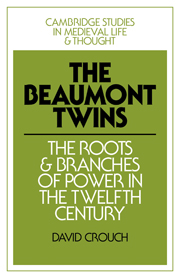Book contents
- Frontmatter
- Contents
- List of illustrations
- Preface
- List of abbreviations
- PART I NARRATIVE
- PART II ANALYSIS
- 4 THE HONORIAL BARONAGE
- 5 ADMINISTRATION
- 6 REVENUES
- 7 THE BEAUMONTS, THE CHURCH AND THE WIDER WORLD
- 8 CONCLUSION
- Appendix I A new source for the death of Robert of Meulan, A. D. 1118
- Appendix II Genealogical tables: I. Tourville, II. Harcourt, III. Hereditary stewards of Meulan
- Bibliography
- Index
4 - THE HONORIAL BARONAGE
Published online by Cambridge University Press: 05 March 2012
- Frontmatter
- Contents
- List of illustrations
- Preface
- List of abbreviations
- PART I NARRATIVE
- PART II ANALYSIS
- 4 THE HONORIAL BARONAGE
- 5 ADMINISTRATION
- 6 REVENUES
- 7 THE BEAUMONTS, THE CHURCH AND THE WIDER WORLD
- 8 CONCLUSION
- Appendix I A new source for the death of Robert of Meulan, A. D. 1118
- Appendix II Genealogical tables: I. Tourville, II. Harcourt, III. Hereditary stewards of Meulan
- Bibliography
- Index
Summary
The second part of this work is intended to be an analysis of the workings of the political fraternity represented by Waleran of Meulan and his twin brother. Studies on the nature of twelfth-century magnate power are all too few at present. Nonetheless it is clear that our starting point must be the honorial baronage. It was this interesting class, which made up the most numerous group within the Anglo-Norman aristocracy, that provided the magnate with his knights, his curia and filled his greater offices. The honorial barons were the political and often physical ancestors of the indentured retainers of the fourteenth and fifteenth centuries: a small coterie by which the magnate supported his dignity and exerted his influence.
The following treatment will not be a comprehensive one. The honorial baronage of the dominions that had been held by Count Robert I of Meulan was a body too numerous to treat in one chapter. What will be examined will be one honorial community in full, Breteuil, which has some advantages for the purpose; elsewhere a representative sample will be taken, consisting of the families of Tourville, Harcourt, Burdet, Wyville and Efflanc. This leaves a considerable number of families out. Taking Stenton's multiplicity of fees as a criterion, in Normandy the baronial families of Du Pin-au-Haras, Marmion, Thibouville (though these three have been studied in passing above), Plasnes, Bigot, Malet, Flancourt, and Saquainville, in the honors of Beaumont and Pont Audemer, have been omitted.
- Type
- Chapter
- Information
- The Beaumont TwinsThe Roots and Branches of Power in the Twelfth Century, pp. 101 - 138Publisher: Cambridge University PressPrint publication year: 1986



